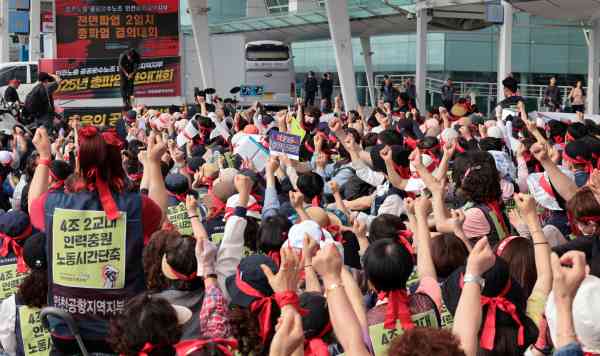Smashing – The busiest travel season in South Korea is about to face a serious challenge. Incheon Airport security workers have announced that they will refuse to work overtime during Chuseok, one of the nation’s most important holidays. For travelers, this raises concerns about long lines, potential delays, and the overall flow of international flights. For workers, it represents a growing demand for fair treatment and improved working conditions. The situation has captured national attention, turning what should be a festive season into a tense standoff.
Why Workers Are Refusing Overtime

The decision by Incheon Airport security workers to refuse overtime during Chuseok is not sudden. It comes after months of unresolved negotiations about staffing shortages, unfair schedules, and stagnant wages. Workers argue that constant overtime has become the norm rather than the exception, leaving them exhausted. The refusal is meant to signal that without structural changes, continuing under these conditions is unsustainable.
Several key reasons stand out:
-
Chronic understaffing has forced extended overtime shifts.
-
Demands for improved pay have not been fully addressed.
-
Lack of additional holiday compensation has created resentment.
-
Growing frustration with management’s slow response to worker concerns.
These issues combine to create a strong sense that refusing overtime is the only way to make their voices heard. The move highlights broader labor challenges across South Korea, especially in sectors where national infrastructure depends on continuous service. The focus keyphrase Incheon Airport security workers captures the human side of this story.
The Impact on Holiday Travel
The timing could not be more critical. Chuseok is the busiest period for domestic and international travel, with millions of people passing through airports. Incheon Airport security workers refusing overtime during Chuseok could disrupt the smooth processing of passengers, causing extended wait times at security checkpoints. Airlines and airport authorities are already preparing contingency plans, but uncertainty remains.
Possible effects on passengers include:
-
Longer waiting times at security gates.
-
Increased pressure on existing staff who only work regular shifts.
-
Potential delays in boarding schedules.
-
Reduced flexibility for handling sudden increases in passenger flow.
For many travelers, the inconvenience may serve as a reminder of how essential Incheon Airport security workers are in keeping global travel running. Their absence from overtime shifts exposes how much the system relies on their extra hours.
Broader Significance of the Refusal
Beyond the immediate disruption, the refusal by Incheon Airport security workers to work overtime during Chuseok highlights bigger questions about labor rights and social priorities. Should national infrastructure be so dependent on workers consistently exceeding normal hours? Should employees have to sacrifice rest, health, and family time just to keep services stable? These questions echo far beyond the walls of the airport.
The situation also reflects a global pattern. Across many industries, workers are re-evaluating the balance between labor and life. From airline pilots to delivery drivers, there is a growing movement demanding fairness. The refusal to work overtime becomes not just a protest but a broader statement about dignity and respect in the workplace.
Key themes raised by this case include:
-
Recognition of the human limits of essential workers.
-
The clash between holiday traditions and modern labor demands.
-
Rising public awareness of invisible struggles in national infrastructure.
-
The potential for ripple effects in labor negotiations across other industries.
This is why the repeated phrase Incheon Airport security workers resonates so strongly. It is not only about one group of employees but about the symbolic weight they carry in a rapidly changing society.
Government and Management Response
Authorities are under pressure to act quickly. With public frustration already building, both government officials and airport management cannot afford to let the standoff escalate further. Negotiations with Incheon Airport security workers have intensified in the weeks leading up to Chuseok, but concrete solutions remain uncertain.
Some measures reportedly under discussion include:
-
Hiring additional temporary staff during the holiday season.
-
Offering financial incentives for workers willing to extend shifts.
-
Improving long-term contracts to reduce reliance on overtime.
-
Opening dialogue about broader structural reforms in staffing.
Whether these steps will be enough is unclear. Workers insist that temporary solutions are not enough to fix systemic issues. For them, refusing overtime during Chuseok is not only about this year’s holiday but about shaping the future of their work.
A Moment That Could Redefine Labor Balance
As the holiday approaches, the eyes of the nation remain fixed on the outcome. Incheon Airport security workers refusing overtime during Chuseok may cause short-term disruption, but it also forces society to confront deeper questions. Can essential services function without exhausting their staff? Can modern economies respect both efficiency and humanity at the same time?
The answer may determine not only how travelers experience this year’s Chuseok but also how future generations will view the balance between work and life. What happens next will be remembered as more than a labor dispute; it will be seen as a turning point in how societies treat the people who keep the most critical systems running.





